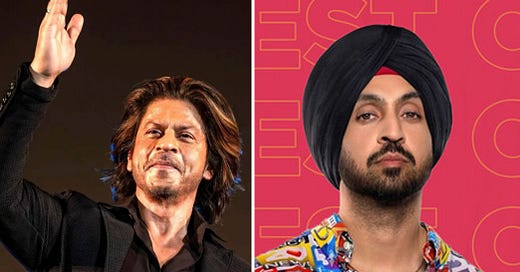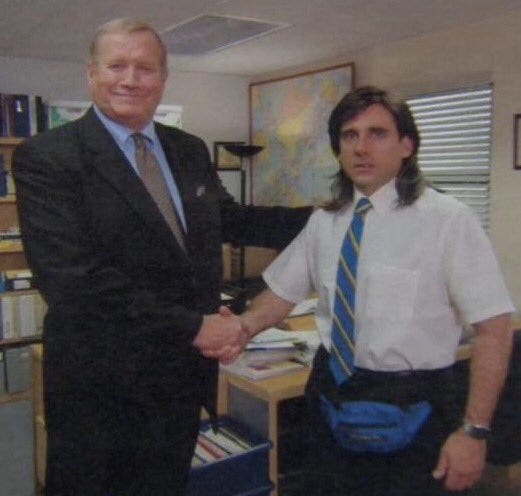Why Are We Obsessed With Loving and Hating Celebrities?
Answered by Two Philosophers: Nietzsche to MC Stan
The obsession with celebrities in our country, or perhaps universally, is so extreme that we imbue them with superhero-like powers to rescue us from our misery. Whether it’s existential dread or political chaos, we seem convinced that the solution lies in a celebrity. If the celeb doesn’t fit the image we’ve created, we project our narratives onto them. This customization of celebrities is integral to their definition in modern culture. Take, for instance, how the hero of Pushpa becomes a working-class icon, seen as their voice and fighter. This is the power of mass indoctrination, where people assign meanings to celebrities that they might not embody in reality.
Recently, Jawan hit theaters, turning Shah Rukh Khan into a liberal superhero. The transformation was partly fueled by dialogues in the film critiquing corruption and encouraging mindful voting—a discourse staple in South Indian cinema that took on a distinct tone in Bollywood. Articles emerged proclaiming SRK as a defiant force against the regime, an anti-fascist figure rising from personal hurt inflicted by the government.
But the illusion didn’t last. When SRK tweeted praise for Modi and attended Smriti Irani’s event, people were shocked. How could an anti-establishment hero do this? Similarly, Diljit Dosanjh—once cast as the last hope against right-wing ideologies—became a symbol of resistance after quoting Rahat Indori. Yet, the narrative shifted again when he released a polished video with Modi, even collaborating on a social media post. The heartbreak was predictable.
What’s happening here? This phenomenon is layered, but the first thought that comes to mind is a meme-worthy observation: people assign revolutionary labels to celebs without asking if they’re even interested in that role. Do they want to be seen as revolutionaries? Do they gain anything from it?
Throughout human history there has been something dangerously seductive about fame, even back in ancient times. Sophocles, in Antigone, warned us with his sharp words: "Fame is a great burden." It’s as if he saw the weight that came with being admired—the constant gaze, the expectations, the inevitable fall. And then Plato said in The Republic (not the Arnab’s channel): "The highest form of recognition is not for the individual, but for the ideas they stand for."
But then standing for the ideas is almost impossible when you have achieved the idea of celebrityhood. In a neoliberal framework, celebrities are commodities, their brand value curated by public relations teams, social media managers, and marketing strategists. The idea of a celebrity is tied to power and perception and relentless work goes into maintaining it. We see the celebrity as an individual, ignoring the massive machinery behind them. These narratives resonate with audiences while concealing the structural advantages celebs enjoy. Celebrities often craft an illusion of relatability—that they think and feel like us. This branding requires effort. Kapil Sharma’s comedy show which is an celeb image-maintenance platform masquerading as comedy show . Questions like, “Do you buy vegetables yourself?” keep the facade alive of them struggling with everyday issues. This is how many stars often say, “Mujhe toh English words nahi aate,” despite speaking the language fluently, to strike a chord with the insecurities of common people. This is a calculated and smartly curated denial of class privilege, a desperate act of posing as lower class to safeguard upper-class dominance.
Also this is the hyper online age where symbols and performances offer greater rewards than real actions. We attach meaning to the smallest gestures and then build fantasies around them. We as users also do this. This is how people attach the idea of rebel as persona, then curate it again and again for mass consumption where the feed itself becomes an arena of battles which has aspects of narcissism , personal branding and perhaps yes possibly the genuine hope for change. Reminds me of what Jio Tolentino has said about in her book Trick Mirror:
“As a medium, the internet is defined by a built-in performance incentive. In real life, you can walk around living life and be visible to other people. But you can’t just walk around and be visible on the internet—for anyone to see you, you have to act. You have to communicate in order to maintain an internet presence. And, because the internet’s central platforms are built around personal profiles, it can seem—first at a mechanical level, and later on as an encoded instinct—like the main purpose of this communication is to make yourself look good. Online reward mechanisms beg to substitute for offline ones, and then overtake them. This is why everyone tries to look so hot and well-traveled on Instagram; this is why everyone seems so smug and triumphant on Facebook; this is why, on Twitter, making a righteous political statement has come to seem, for many people, like a political good in itself.”
Also we live in a time when the idea of icons has diminished. It's over! We have no icons left. All we now have the desperation of seeking one. Inventing one. The postmortem results of death of an icon can range from image saturation to internet’s over-accessibility that diminished the aura around them. There’s also a saying about love which was popular in the tumblr era of cheap sentimental pages: knowing too much about someone makes you lose interest, be a little ignorant.
The internet, in this age of endless information overload, constantly throws new facts at us, reminding us that the people we once admired have, at some point, might have been 'problematic.' And hence, now they are no longer consumable.
This consistent disillusionment has created a sense of cultural orphanage, where we are now desperately seeking new daddies daily. Yet failing it, every time. The desperation is both laughable and tragic, that evokes Nietzsche’s observation: “The lonely one offers his hand too quickly to anyone who will reach for it.” Or Perhaps rapper MC Stan who once said :
“Ek din pyaar phir doosre din tum hate karte
Teesre din beemar phir chauthe din tum wait karte”
-If you enjoyed this piece and then please consider supporting independent writing through Patreon or via UPI. Check links on sidebars.Your support keeps this work alive and encourage us to write more!







When celebrities or for that matter any figure is surrounded with an image, a whole set of individuals benefit from it. When Che Guevara was tagged a rebel, he became the hero for all those countries that were struggling, and surely Castro benefited from him. But unlike Guevara, whose fate resided in sticking to his image and finally dying at the hands of capitalists, the new age celebs very well know how to dissociate themselves with the image. As for other individuals who are benefiting from it, when SRK was portrayed as a revolutionary, even people working in the industry had put up instagram stories showing common people dancing to his song, as if some song from Jawan was the new anti-authoratian tune, as if it was a pied piper hypnotizing people leading them to freedom. 🤣 (Though I personally don't feel the rule is authotarian, just quoting the language of people who are not satisfied with the gov). Then a new image was projected that with the love man SRK( spreading his message of eternal love ) would be the final nail in the coffin of Mr. Modi. But alas he won. I'm sure it wasn't only SRK but a lot many people who benefited by selling this persona. The only victim here are the NAIVE consumers who see their hopes shredded. The rest ALL, especially those who are accustomed to how politics and glamour, are using this mechanism to sell something.
Celebrityhood in the US and other western countries have been normalised to a large extent because people have other political ways to vent out their anger. Even the bureaucratic hellhole of the erstwhile Soviet Union was not much concerned with its subjects private life (freedom to choose whom to marry, what to eat, religion etc). This acted as a release valve for the total political opression. While in India we got the worst of both worlds (repressive political AND the private life) and the only source of release is these "entertainers" who keep on parroting appropriate agency trained lines and gets clicked at the airports. A 22 year Zomato delivery executive's only source of release is Allu Arjun's character in the Pushpa universe from the choking repression that begins at his family (from his parents especially) and keeps getting added like onion peel